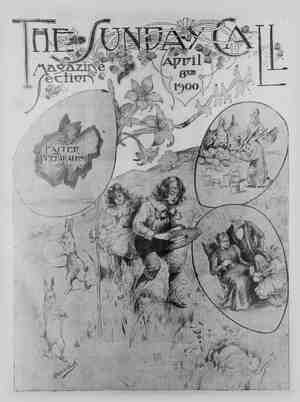The San Francisco Call. Newspaper, April 8, 1900, Page 6
You have reached the hourly page view limit. Unlock higher limit to our entire archive!
Subscribers enjoy higher page view limit, downloads, and exclusive features.
THE SUNDAY CALL THE WoRDS 3HE UTTERED UPON THAT OGCASION REMAINED ENGRAVED eee--aseseceseseceses MEMORY OF ALL WHO HEARD HER,------u-,..-...-,......!N THE All Rights Reserved. CHAPT L F\\\\FIS. llke ev .‘r)’ ¢ ital, is made up [Jot several towns, some of them very JI= tiny. Once through the city gates, particularly on the west, one is im- mediately in other towns that are still Paris, or only dis guished from it by a mere administrative fiction. B these, for example Neuilly or Lavallols, have the appearance, population and the toms of a provincial center. A foreigner led to the suburb of St. Charles, ad- Javel quarter, to stroll abe day before returning to 1ld carry away with him And he would ve visited one of the capital's annexes, situated within a few rifle shots of the Arc de . and which in ten years, when the fortifications are demolished, will be Par St. Charles occuples an angular space on the left bank of the Seine, between the river and the belt line of the city. The Porte de Bas-Meudon s the apex of the angle. The principal artery of the capital is a continuance of the Rue Charles, ewhich traverse the whole length of Javel and keeps the name on the other side of the fortifications. About sixty out of every hundred Paris- fans would be amazed to learn that the Rue St. Charles resembles the Rue St Denis in the aspect of its houses, the or- namentation of its sidewalks with monu- mental fountains and its commercial ani- mation. The bitant of the quarter purchases all the ne ries of life in this street. When his demands exceed the resources of the Rue St. Charles shop- keeper, the latter replies to the purchaser exactly as a colieague in Mantes or Ro- morantin would reply in a similar case: “I can order it for you from Paris.” And the inhabitant of St. Charles will y to his wife in the morning: Don't expect me to luncheo odliged to go to Paris.” It may be well to give a few detalls about the St. Charlesian; an individual rarely seen by the Parisfan. As in towns of the United States, a distinction must be made between the native autochthonous in- habitant and the immigrant. St. Charles is an ancient village. On account of the slow means of communication it was as distant from Paris a hundred years ago a village of the Loiret or of the Eure is to-day. This amounts to saying that in the Paris of Louis XVI the very name of the village was ignored; the Inhabitants were simply agriculturists, of whom many lived and died without ever having seen the Louvre. Several of . these original fami! of agriculturists still exist, and are recog- nizable by the names found in numbers upon the shop signs, names which already figured upon the anclent parish registers of the beginning of the seventeenth cen- tury. Froment, Martin, Bahuchet occur the most frequently. These native inhab- itants, through some mysterious law which no one has found interesting enough to investigate, are almost all mod- est retail dealers—tinsmiths, grocers, bak- ers. Not a single Bahuchet, Martin or Froment is reputed rich in a commune where some immense industrial fortunes bave been built. These all belong to tha ; I am 1 Parls, ir mansion in the Par four dail orkmen, the X ly became t habit what may rbs of urb. charactertst! ¢ lying risap 3 e reta ke lest clerks; another of workmen rs perior in number, and no wealthy peog although the whole of 8 to big capital there, as everywh by the moneyed peop Th rarel time to eclipse. turer f eatre and t fa en years is a g 3 are conservattve, like all the alation of France, through a terror inspired by the vague peril of spoliation in St. Char marrow, ers; Iimit They to bec municipa clals in the hospital covet a place in th a youth ma atics he When his m he frequ and obtai at Roussin, some co princes. faced ba passing before > hour when the factory g tocsin march past and ca “Look at the an But the have n workingmen's party powerful in St. C t nters, were narrow mir this. about 1880 t an ambiti organized by one to take his party split In conducted by monarchists clericals envenomed turned them to accou men’s party made an alllance with the actionaries, overthrew the Muniefpal Council and replaced it with one made up of reactionaries and of so-called extreme socfalists. This strange combination e isted for thren years, was defeated in jog turn by the allied socialists and radicals, frer
